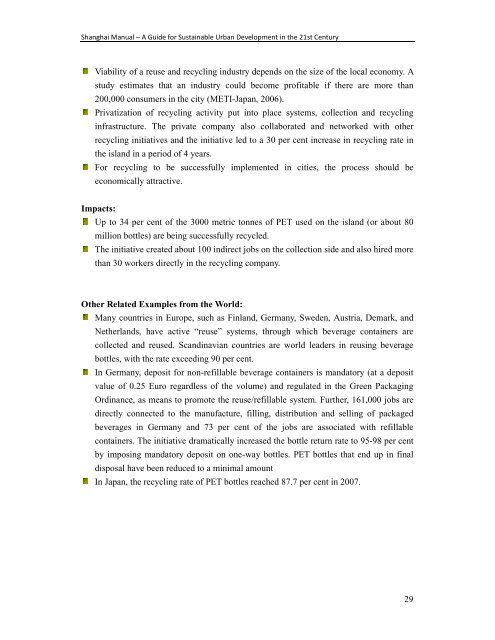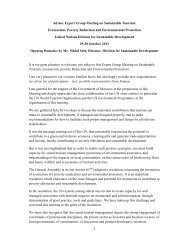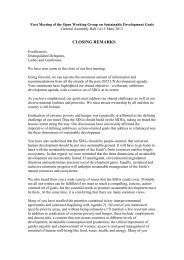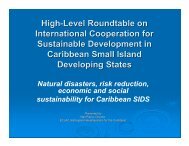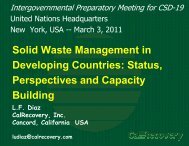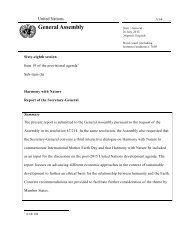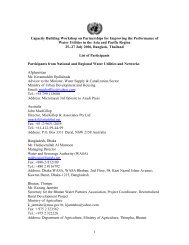- Page 2 and 3:
IntroductionShanghai ManualA Guide
- Page 4 and 5:
Introduction3FOREWORD - BUREAU INTE
- Page 6 and 7:
IntroductionFOREWORD - CITY OF SHAN
- Page 8 and 9:
IntroductionFinally we wish to appr
- Page 10 and 11:
IntroductionThe iconic China pavili
- Page 12 and 13:
Introductionwas always meant to be
- Page 14 and 15:
IntroductionWORLD EXPO 2010 SHANGHA
- Page 16 and 17:
IntroductionTo Build a Smart and Ac
- Page 18 and 19:
Shanghai Manual - A Guide for Susta
- Page 20 and 21:
Shanghai Manual - A Guide for Susta
- Page 22 and 23:
Shanghai Manual - A Guide for Susta
- Page 24 and 25:
Shanghai Manual - A Guide for Susta
- Page 26 and 27:
Shanghai Manual - A Guide for Susta
- Page 28 and 29:
Shanghai Manual - A Guide for Susta
- Page 30 and 31:
Shanghai Manual - A Guide for Susta
- Page 33 and 34:
Envisioning a Harmonious City with
- Page 35 and 36:
Envisioning a Harmonious City with
- Page 37 and 38:
Delivering Effective Urban Manageme
- Page 39 and 40:
Delivering Effective Urban Manageme
- Page 41 and 42:
Delivering Effective Urban Manageme
- Page 43 and 44:
Delivering Effective Urban Manageme
- Page 45 and 46:
Delivering Effective Urban Manageme
- Page 47 and 48:
Delivering Effective Urban Manageme
- Page 49 and 50:
Delivering Effective Urban Manageme
- Page 51 and 52:
Delivering Effective Urban Manageme
- Page 53 and 54:
Delivering Effective Urban Manageme
- Page 55 and 56:
Delivering Effective Urban Manageme
- Page 57 and 58:
Delivering Effective Urban Manageme
- Page 59 and 60:
Delivering Effective Urban Manageme
- Page 61 and 62:
Delivering Effective Urban Manageme
- Page 63 and 64:
Delivering Effective Urban Manageme
- Page 65 and 66:
Delivering Effective Urban Manageme
- Page 67 and 68:
Delivering Effective Urban Manageme
- Page 69 and 70:
Delivering Effective Urban Manageme
- Page 71 and 72:
Delivering Effective Urban Manageme
- Page 73 and 74:
Delivering Effective Urban Manageme
- Page 75 and 76:
Delivering Effective Urban Manageme
- Page 77 and 78:
Transforming the Urban Economymanag
- Page 79 and 80:
Transforming the Urban Economymanuf
- Page 81 and 82:
Transforming the Urban Economycarbo
- Page 83 and 84:
Transforming the Urban Economy2.2.
- Page 85 and 86:
Transforming the Urban Economylimit
- Page 87 and 88:
Transforming the Urban Economy3. CA
- Page 89 and 90:
Transforming the Urban EconomyExpor
- Page 91 and 92:
Transforming the Urban EconomyHisto
- Page 93 and 94:
Transforming the Urban EconomyThe m
- Page 95 and 96:
Transforming the Urban Economy3.3.
- Page 97 and 98:
Transforming the Urban EconomySouth
- Page 99 and 100:
Transforming the Urban EconomyAs on
- Page 101 and 102:
Transforming the Urban Economycombi
- Page 103 and 104:
Transforming the Urban EconomyPolic
- Page 105 and 106:
Transforming the Urban Economy“Ci
- Page 107 and 108:
Sustainable Urban Transportelements
- Page 109 and 110:
Sustainable Urban Transport1.2 URBA
- Page 111 and 112:
Sustainable Urban TransportIn fact,
- Page 113 and 114:
Sustainable Urban Transportconvenie
- Page 115 and 116:
Sustainable Urban Transportreductio
- Page 117 and 118:
Sustainable Urban TransportCaption:
- Page 119 and 120:
Sustainable Urban Transportstart us
- Page 121 and 122: Sustainable Urban Transportlow inco
- Page 123 and 124: Sustainable Urban TransportThe city
- Page 125 and 126: Sustainable Urban TransportEnrique
- Page 127 and 128: Sustainable Urban Transportwhile sp
- Page 129 and 130: Sustainable Urban Transportcycling,
- Page 131 and 132: Sustainable Urban Transportneed to
- Page 133 and 134: Sustainable Urban TransportAn addit
- Page 135 and 136: Sustainable Urban TransportThis sch
- Page 137 and 138: Sustainable Urban TransportThe LEZ
- Page 139 and 140: Sustainable Urban Transport- Net re
- Page 141 and 142: Sustainable Urban TransportPolicy O
- Page 143 and 144: Sustainable Urban TransportAsian De
- Page 145 and 146: Municipal Solid Waste ManagementAs
- Page 147 and 148: Municipal Solid Waste ManagementFig
- Page 149 and 150: Municipal Solid Waste ManagementFig
- Page 151 and 152: Municipal Solid Waste ManagementBox
- Page 153 and 154: Municipal Solid Waste Management・
- Page 155 and 156: Municipal Solid Waste ManagementSou
- Page 157 and 158: Municipal Solid Waste Managementbei
- Page 159 and 160: Municipal Solid Waste Managementinc
- Page 161 and 162: Municipal Solid Waste Managementof
- Page 163 and 164: Municipal Solid Waste Management3.
- Page 165 and 166: Municipal Solid Waste ManagementThe
- Page 167 and 168: Municipal Solid Waste Management3.2
- Page 169 and 170: Municipal Solid Waste Managementbe
- Page 171: Municipal Solid Waste ManagementMin
- Page 175 and 176: Municipal Solid Waste Managementper
- Page 177 and 178: Municipal Solid Waste ManagementStr
- Page 179 and 180: Municipal Solid Waste Management8.
- Page 181 and 182: Green Buildings for a Resource Effi
- Page 183 and 184: Green Buildings for a Resource Effi
- Page 185 and 186: Green Buildings for a Resource Effi
- Page 187 and 188: Green Buildings for a Resource Effi
- Page 189 and 190: Green Buildings for a Resource Effi
- Page 191 and 192: Green Buildings for a Resource Effi
- Page 193 and 194: Green Buildings for a Resource Effi
- Page 195 and 196: Green Buildings for a Resource Effi
- Page 197 and 198: Green Buildings for a Resource Effi
- Page 199 and 200: Green Buildings for a Resource Effi
- Page 201 and 202: Green Buildings for a Resource Effi
- Page 203 and 204: Embracing Scientific and Technologi
- Page 205 and 206: Embracing Scientific and Technologi
- Page 207 and 208: Embracing Scientific and Technologi
- Page 209 and 210: Embracing Scientific and Technologi
- Page 211 and 212: Embracing Scientific and Technologi
- Page 213 and 214: Embracing Scientific and Technologi
- Page 215 and 216: Embracing Scientific and Technologi
- Page 217 and 218: Embracing Scientific and Technologi
- Page 219 and 220: Embracing Scientific and Technologi
- Page 221 and 222: Embracing Scientific and Technologi
- Page 223 and 224:
Embracing Scientific and Technologi
- Page 225 and 226:
Embracing Scientific and Technologi
- Page 227 and 228:
Shanghai Manual - A Guide for Susta
- Page 229 and 230:
Shanghai Manual - A Guide for Susta
- Page 231 and 232:
Shanghai Manual - A Guide for Susta
- Page 233 and 234:
Shanghai Manual - A Guide for Susta
- Page 235 and 236:
Shanghai Manual - A Guide for Susta
- Page 237 and 238:
Shanghai Manual - A Guide for Susta
- Page 239 and 240:
Shanghai Manual - A Guide for Susta
- Page 241 and 242:
Shanghai Manual - A Guide for Susta
- Page 243 and 244:
Shanghai Manual - A Guide for Susta
- Page 245 and 246:
Shanghai Manual - A Guide for Susta
- Page 247 and 248:
Shanghai Manual - A Guide for Susta
- Page 249 and 250:
Shanghai Manual - A Guide for Susta
- Page 251 and 252:
Shanghai Manual - A Guide for Susta
- Page 253 and 254:
Shanghai Manual - A Guide for Susta
- Page 255 and 256:
Shanghai Manual - A Guide for Susta
- Page 257 and 258:
Fostering Culturally Rich Communiti
- Page 259 and 260:
Fostering Culturally Rich Communiti
- Page 261 and 262:
Fostering Culturally Rich Communiti
- Page 263 and 264:
Fostering Culturally Rich Communiti
- Page 265 and 266:
Fostering Culturally Rich Communiti
- Page 267 and 268:
Fostering Culturally Rich Communiti
- Page 269 and 270:
Fostering Culturally Rich Communiti
- Page 271 and 272:
Fostering Culturally Rich Communiti
- Page 273 and 274:
Fostering Culturally Rich Communiti
- Page 275 and 276:
Fostering Culturally Rich Communiti
- Page 277 and 278:
Fostering Culturally Rich Communiti
- Page 279 and 280:
Fostering Culturally Rich Communiti
- Page 281 and 282:
Fostering Culturally Rich Communiti
- Page 283 and 284:
Fostering Culturally Rich Communiti
- Page 285 and 286:
Shanghai Manual - A Guide for Susta
- Page 287 and 288:
Shanghai Manual - A Guide for Susta
- Page 289 and 290:
Shanghai Manual - A Guide for Susta
- Page 291 and 292:
Shanghai Manual - A Guide for Susta
- Page 293 and 294:
Shanghai Manual - A Guide for Susta
- Page 295 and 296:
Shanghai Manual - A Guide for Susta
- Page 297 and 298:
Shanghai Manual - A Guide for Susta
- Page 299 and 300:
Shanghai Manual - A Guide for Susta
- Page 301 and 302:
Shanghai Manual - A Guide for Susta
- Page 303 and 304:
Shanghai Manual - A Guide for Susta
- Page 305 and 306:
Shanghai Manual - A Guide for Susta
- Page 307 and 308:
Shanghai Manual - A Guide for Susta
- Page 309 and 310:
Shanghai Manual - A Guide for Susta
- Page 311 and 312:
Shanghai Manual - A Guide for Susta
- Page 313 and 314:
Shanghai Manual - A Guide for Susta
- Page 315 and 316:
Shanghai Manual - A Guide for Susta
- Page 317 and 318:
Shanghai Manual - A Guide for Susta
- Page 319 and 320:
Shanghai Manual - A Guide for Susta


